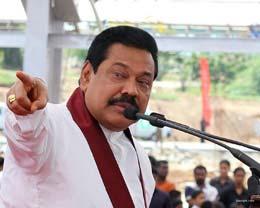Sri Lanka denies wartime abuses after scathing report

The heads of Commonwealth governments should boycott the Commonwealth summit in Sri Lanka in November due to its unwillingness to address human rights concerns, Human Rights Watch is urging.
Those governments deciding to attend should send a low-level delegation as a public message of dissatisfaction, it said in a letter to the 54 heads of Commonwealth countries. Other opponents. Including Lawyers Rights Canada have called the meeting a summit of shame that discredits the values of the Commonwealth.
During a visit to Sri Lanka in August, the UN high commissioner for human rights Navi Pillay expressed grave concern about lack of accountability, unresolved enforced disappearances and decreasing fundamental freedoms, among other issues.
“The Sri Lankan government should be shunned - not rewarded - for failing to hold anyone accountable for war crimes during the country’s recent conflict,” said Brad Adams at Human Rights Watch, the New York based group said.
“Attending a summit in Sri Lanka so soon after the UN rights chief decried a worsening situation sends the wrong message to the government and to victims seeking justice.”
Since the end of the armed conflict in May 2009, the human rights record under the administration of President Mahinda Rajapaksa has remained poor.
The government has become increasingly authoritarian, attacking the independence of the judiciary and severely limiting the space for public criticism by the media and human rights groups.
Despite credible allegations by both the UN Secretary-General’s Panel of Experts and the government’s own Lessons Learnt and Reconciliation Commission (LLRC) of wartime abuses by both sides, the government has undertaken no serious investigations or prosecutions.
The Panel of Experts estimated that as many as 40,000 civilians died in the final months of the war.
“Holding the summit in Sri Lanka casts serious doubts on the Commonwealth’s stated commitment to supporting human rights and democratic reform,” Adams said.
“Instead of participating in a propaganda coup for the Sri Lankan government, Commonwealth heads of government should stay home and publicly press Sri Lanka on its repressive policies and lack of accountability.”
Canadian Prime Minister Stephen Harper has already announced he will boycott the meeting, but others including British Prime Minister David Cameron are expected to attend.
Harper's government has also criticised the Commonwealth for "accommodating evil" by allowing Colombo to host the biannual summit.
Sri Lanka has rejected the charges and maintains that its troops did not kill a single civilian.
It has strongly rejected criticism from the UN’s most senior human rights official, who admonished its government for creeping authoritarianism and inaction on war crimes allegedly committed during the final stages of its two-decade civil conflict.
Navi Pillay, UN high commissioner for human rights, delivered the unusually stern rebuke at the conclusion of a high-profile week-long visit to the south Asian island nation, as part of efforts by international bodies and western powers pushing for an investigation into allegations of wartime human rights abuses.
President Mahinda Rajapaksa won a decisive victory over the Tamil Tiger guerrillas in 2009, but did so at the cost of as many as 40,000 civilian deaths, according to UN reports.
Rajapaksa has since presided over an improved economy, but has also sharply consolidated his grip on power in a government dominated by his own family, including his two powerful brothers, Gotabaya and Basil, who control the nation’s defence and economic development ministries respectively.
Ms Pillay chastised the regime both for its lack of progress investigating war crime allegations and a general drift towards an authoritarian style of rule that has alarmed both western leaders and international investors.
“I am deeply concerned that Sri Lanka, despite the opportunity provided by the end of the war to construct a new vibrant all-embracing state, is showing signs of heading in an increasingly authoritarian direction,” she said.
But in a harshly worded statement, Sri Lanka’s information ministry dismissed the remarks and attacked Pillay directly, saying her statement “clearly transgresses her mandate and the basic norms which should be observed by a discerning international civil servant”.
“The judgment on the leadership of the country is better left for the people of Sri Lanka to decide, than being caricatured by external entities influenced by vested interests,” the statement said.
Sri Lanka’s intransigence in the face of such pressure now poses awkward challenges for the countries which backed the resolution, including neighbouring India, who continue to press Rajapaksa to investigate wartime abuses and introduce further devolution of power in the nation’s Tamil-majority northern region.
This task is also viewed as an important test case by some senior members of US President Barack Obama’s national security team, including former human rights professor and now US ambassador to the UN, Samantha Power, analysts say.
Many of the alleged wartime abuses occurred in early 2009, making Sri Lanka the first country to break such international human rights norms following Obama’s inauguration as US president.
“America has lost patience with the Sri Lankans, but there is now a real worry about credibility,” says one western diplomat, speaking on condition of anonymity. “If the US and its allies can’t even get a small country like Sri Lanka to behave itself, what hope does it have in more difficult cases, let alone somewhere like Syria?”
Leave a comment









